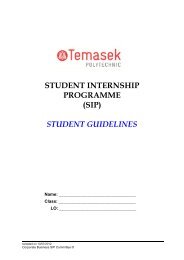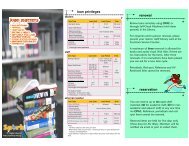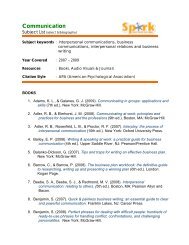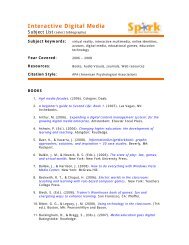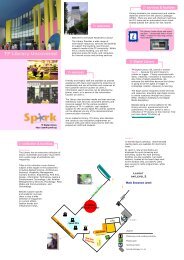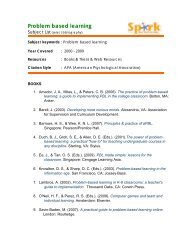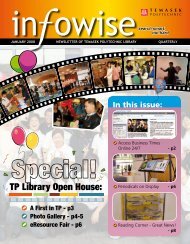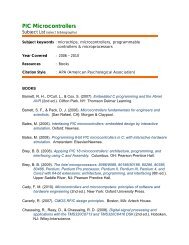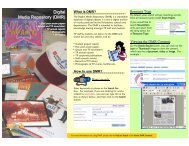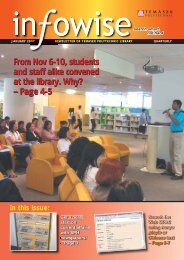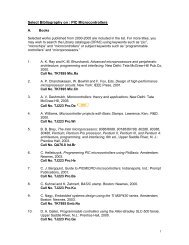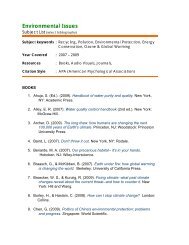STUDENT INTERNSHIP PROGRAMME (SIP) STUDENT GUIDELINES
STUDENT INTERNSHIP PROGRAMME (SIP) STUDENT GUIDELINES
STUDENT INTERNSHIP PROGRAMME (SIP) STUDENT GUIDELINES
Create successful ePaper yourself
Turn your PDF publications into a flip-book with our unique Google optimized e-Paper software.
<strong>STUDENT</strong> <strong>INTERNSHIP</strong><br />
<strong>PROGRAMME</strong><br />
(<strong>SIP</strong>)<br />
<strong>STUDENT</strong> <strong>GUIDELINES</strong><br />
Name: ________________________________<br />
Class: ________________________________<br />
LO: ________________________________<br />
Updated on 06/06/2008<br />
Corporate Business <strong>SIP</strong> Committee ©
CONTENT<br />
Page<br />
I. Objectives of <strong>SIP</strong> 1<br />
II.<br />
Responsibilities & Expectations<br />
1. On-The-Job Training 2<br />
2. On-Campus Training 5<br />
3. Assessment 6<br />
4. Travelling Overseas 8<br />
III. Guidelines to Written Report<br />
1. Format of Report 9<br />
2. Company’s Environment Management Programme 11<br />
3. Guides to Functional /Specialised Areas 11<br />
4. Written Report Cover Page 20<br />
Important Note:<br />
Students are expected to be familiar with the requirements of the <strong>SIP</strong> as<br />
laid out in the Student Guidelines. Ignorance will not be accepted as a<br />
reason for non-compliance with any of the <strong>SIP</strong> requirements.<br />
Updated on 06/06/2008<br />
Corporate Business <strong>SIP</strong> Committee ©
OBJECTIVES<br />
<strong>SIP</strong><br />
The 3 key objectives of the Student Internship Programme are as follows:<br />
• To expose you to the business<br />
environment so that you will perform<br />
more competently in your future job.<br />
The attachment gives you the opportunity to<br />
apply knowledge as well as creativity in an<br />
actual working environment.<br />
• To initiate you into the world of work so<br />
that you will have a more realistic<br />
perspective of working life.<br />
The exposure provides an insight into areas<br />
such as job opportunities, expected<br />
responsibilities, and the customs and practices<br />
prevailing in company and industry. You learn<br />
to cope with work pressure and to manage<br />
working relationships.<br />
• To provide you with the opportunities to<br />
take responsibilities for your own<br />
learning and test your own<br />
resourcefulness.<br />
Learning by doing lets you experience and<br />
understand the work process. The process of<br />
solving problem in a working place allows you<br />
to apply and reflect on what you have learned<br />
in the Polytechnic. The extent of learning<br />
depends on your personal goals,<br />
resourcefulness and initiative.<br />
With a positive and conscientious attitude towards the job<br />
attachment, these objectives are achievable.<br />
The company provides the working context.<br />
The Liaison Officer (LO) provides the guidance.<br />
But it is YOU who must decide<br />
what and how much to get out of the experience.<br />
Updated on 06/06/2008 1<br />
Corporate Business <strong>SIP</strong> Committee ©
RESPONSIBILITIES & EXPECTATIONS<br />
<strong>SIP</strong><br />
1. ON-THE-JOB TRAINING<br />
1.1 Attendance<br />
1.1.1 Students must record daily attendance either in the <strong>SIP</strong><br />
Attendance form in the <strong>SIP</strong> Student Logbook or the company’s<br />
Time Card, whichever is applicable. Daily attendance must be<br />
endorsed by the supervisor in-charge. Where applicable, the<br />
company Time Card must be attached as an appendix to the<br />
final Written Report.<br />
1.1.2 Leave is not allowed except for the following:<br />
a) Medical Leave<br />
All medical certificates issued by a registered medical<br />
practitioner (i.e. not a Chinese sinseh) must be attached<br />
to the Leave Application Form. If you take excessive<br />
medical leave, you may be required to make up for the<br />
days taken without pay, at the discretion of your LO and<br />
the company.<br />
b) Compassionate Leave<br />
Only compassionate leave due to death of immediate<br />
family member will be allowed. A certified copy of the<br />
death certificate must be attached to the Leave<br />
Application Form.<br />
c) Special / Emergency Leave.<br />
This is subject to approval by Company Supervisor & LO<br />
on a case-by-case basis.<br />
d) Supplementary Examination Leave<br />
Students are entitled to 2 working days leave for every<br />
supplementary examination paper which they have to<br />
take. These 2 days include the day of the paper itself. For<br />
every additional supplementary paper, an additional 2<br />
days of leave will be allowed, subject to a maximum of 5<br />
working days. For example:<br />
If a student has to take 2 supplementary papers, he will<br />
be allowed 4 working days of study leave. If he has to<br />
take 3 or more supplementary papers, he will be allowed<br />
a maximum of 5 working days of study leave only.<br />
Students who take leave under a) and b) must inform the<br />
Company Supervisor and LO IMMEDIATELY. The form must<br />
be submitted within 2 working days to the Company<br />
Updated on 06/06/2008 2<br />
Corporate Business <strong>SIP</strong> Committee ©
Supervisor for endorsement, with a copy forwarded to the<br />
respective LO for record.<br />
For leave applied under c) and d), students must obtain<br />
approval from Company Supervisor & LO first before they<br />
go on leave.<br />
Students should use the Leave Application Form available at<br />
website http://www-bus.tp.edu.sg/ under Industry / Student /<br />
Forms.<br />
1.1.3 Students who consume the approved leave under a) to c) may<br />
be liable for an extended <strong>SIP</strong> attachment. This serves to make<br />
up for the period of leave taken. An extended attachment period<br />
AND/OR other consequences may be imposed by the <strong>SIP</strong><br />
Committee<br />
1.1.4 Absence without approval can result in an immediate failure<br />
of <strong>SIP</strong>.<br />
1.2 Discipline<br />
1.2.1 Disciplinary offences will be seriously dealt with and this can<br />
lead to a failure in the <strong>SIP</strong>. Should this happen, the student<br />
concerned might have to repeat the <strong>SIP</strong> in the following<br />
academic year. This in turn means a delay in graduation.<br />
1.2.2 The following constitute disciplinary offences:<br />
- Refusal to follow instructions.<br />
- Termination by the company due to poor performance or<br />
conduct.<br />
- Absence from work without valid reason.<br />
- Late for or absence from the <strong>SIP</strong> launch and On-Campus<br />
Training sessions without valid reason.<br />
- Non-conformity with company's dress code.<br />
- Unacceptable quality of work, such as untidiness and<br />
carelessness.<br />
- Tardiness in reporting for work.<br />
- Insubordination.<br />
- Pilferage of any forms, such as stationery and inventory.<br />
Updated on 06/06/2008 3<br />
Corporate Business <strong>SIP</strong> Committee ©
- Failure to inform Company Supervisor of whereabouts<br />
when required.<br />
- Breach of confidentiality.<br />
- Photocopying of confidential information / documents<br />
without official permission.<br />
- Duplication of software/confidential information used by<br />
the company, without official permission.<br />
- Bringing personal or pirated software to the company.<br />
- Using company PC to surf the Internet for personal<br />
purposes<br />
- Terminating the attachment or “resigning” from the<br />
company without authorisation<br />
1.2.3 Under no circumstances are students allowed to terminate<br />
the attachment on their own accord. Students are to consult<br />
their LOs who will deal with any problems that arise.<br />
1.3 Liaison Officer (LO)<br />
1.3.1 A lecturer known as the Liaison Officer (LO) will be assigned to<br />
oversee each student’s attachment and will visit the company<br />
during the programme.<br />
1.3.2 Do not hesitate to approach the LO on any problems regarding<br />
the programme.<br />
1.3.3 In the absence of the LO, student is to contact the Alternate<br />
Liaison Officer (ALO).<br />
1.4 <strong>SIP</strong> Student Log Book<br />
1.4.1 Record daily activities, observations, learning points and<br />
reflections in the log book. A regular and consistent recording<br />
of the daily learning activities will facilitate good report<br />
writing later.<br />
1.4.2 At the end of each week, obtain comments or advice for<br />
improvement from the Company Supervisor (CS).<br />
1.4.3 Always keep the <strong>SIP</strong> student log book properly. A police<br />
report is required if it is lost as the information contained in the<br />
log book is confidential.<br />
1.4.4 Bring the <strong>SIP</strong> student log book to the On-Campus sessions and<br />
record significant learning points.<br />
Updated on 06/06/2008 4<br />
Corporate Business <strong>SIP</strong> Committee ©
1.4.5 Upon completion of the <strong>SIP</strong>, submit the duly completed log book<br />
as an appendix to the written report.<br />
1.5 Training Programme<br />
1.5.1 The LO will hand each student a training programme that has<br />
been finalised in consultation with the CS.<br />
1.5.2 Use this programme as a frame of reference for the attachment.<br />
Approach the CS for advice should there be insufficient<br />
exposure/work on any items that are included in the programme.<br />
1.5.3 The programme may not have a comprehensive list of<br />
assigned work for the job attachment. The CS has the<br />
discretion to amend the assigned work during the <strong>SIP</strong>.<br />
2. ON-CAMPUS TRAINING<br />
2.1 On-Campus Sessions<br />
The number of on-campus sessions will vary from diploma to diploma.<br />
Students are to refer to the Programme Structure at the <strong>SIP</strong> website<br />
http://www-bus.tp.edu.sg/ under Industry / Student for more details of<br />
the on-campus sessions of your diploma.<br />
2.1.1 The purpose of the on-campus sessions are :<br />
- To allow sharing and communication among students<br />
attached to different companies.<br />
- For the LO to follow-up on students’ progress with regard to<br />
their work and the writing of the report.<br />
- For students to discuss any administrative matter or problem<br />
encountered at the company. The problem should be<br />
resolved together with the LO.<br />
- For students to present the attendance sheet and updated<br />
records of Daily and Weekly Summary of Tasks to the LO for<br />
review and comments.<br />
- For students to seek advice from LO on the completion of the<br />
written report.<br />
2.1.2 Failure to attend these sessions will be regarded as being<br />
absent from class. Disciplinary action will be taken which may<br />
result in an immediate failure of <strong>SIP</strong>.<br />
2.1.3 Students are to share and discuss situations and problems<br />
that surfaced during the <strong>SIP</strong> attachment.<br />
Updated on 06/06/2008 5<br />
Corporate Business <strong>SIP</strong> Committee ©
3. ASSESSMENT<br />
2.1.4 Keen participation and constructive contribution by students will<br />
enhance the <strong>SIP</strong> learning process.<br />
3.1 Assessment structure<br />
3.1.1 The <strong>SIP</strong> assessment system is based on four components:<br />
a. Participation in Classroom Sessions<br />
b. Submission of e-journals<br />
c. Performance Appraisal by the Company Supervisor<br />
d. Written Report<br />
3.1.2 To pass <strong>SIP</strong>, students must fulfil the requirements of all the four<br />
components. The following grades will be awarded for each of<br />
the four components:<br />
• Pass with Commendation<br />
• Pass<br />
• Fail<br />
3.2 Participation in Classroom Sessions<br />
Classroom assessment will be based on the following factors:<br />
3.2.1 Attendance & Punctuality<br />
Students who are late for 15 minutes or more will be<br />
considered absent from the classroom session.<br />
3.2.2 Willingness and readiness to share and contribute.<br />
3.2.3 Ability to recall and relate theory to the real world.<br />
For those doing overseas <strong>SIP</strong>, an oral presentation of the report will<br />
replace the component on participation in classroom sessions.<br />
3.3 Submission of e-journals<br />
Students are required to submit e-journals to their LOs regularly<br />
through their TP email account. The content of the e-journal may<br />
include a brief summary of the work assigned and problems/difficulties<br />
encountered at the work place.<br />
3.4 Performance Appraisal by the Employer<br />
3.4.1 The Company Supervisor will appraise student’s on-the-job<br />
performance. Familiarise yourself with the Performance<br />
Updated on 06/06/2008 6<br />
Corporate Business <strong>SIP</strong> Committee ©
Appraisal (PA) form so that you are fully aware of the<br />
Polytechnic and Company Supervisor’s expectations.<br />
3.4.2 Print a copy of the Performance Appraisal (PA) Form available<br />
at website http://www-bus.tp.edu.sg/ under Industry / Student /<br />
Forms and submit to your supervisor. Do not use the PA Form<br />
found in the Student Logbook.<br />
3.4.3 At the end of the attachment period, obtain the completed PA<br />
Form from the Company Supervisor. Place it in a sealed<br />
envelope and submit it together with the final written report to<br />
your LO. Inform your LO if your company supervisor has a<br />
different practice.<br />
3.5 Written Report<br />
3.5.1 Print the Written Report Cover Page found on page 20 of this<br />
guideline and attach as the cover page of the written report.<br />
3.5.2 Read the “Guidelines to Written Report” before starting the <strong>SIP</strong>,<br />
and be familiar with the written report assessment criteria.<br />
Submit the Written Report to the LO by the stipulated deadline<br />
specified in the respective diploma’s Important <strong>SIP</strong> Dates at<br />
website http://www-bus.tp.edu.sg/ under Industry / Student. Any<br />
report submitted after 5pm will not be accepted, and<br />
consequently student will fail the <strong>SIP</strong>.<br />
3.5.3 Seek advice from the LO during the final on-campus session<br />
regarding the written report.<br />
3.5.4 Attach the following as appendices to the written report:<br />
(i) <strong>SIP</strong> Student Log Book – to be duly completed and endorsed<br />
by the company supervisor and LO.<br />
(ii) Self Appraisal Form (available from website http://wwwbus.tp.edu.sg/<br />
under Industry / Student / Forms Appendix B)<br />
– to be duly completed by student.<br />
Students MUST complete the on-line student feedback and write<br />
the Date/Time control number on the cover page of the written<br />
report. The student feedback website address can be found at<br />
http://www-bus.tp.edu.sg/ under Industry / Student / Reflecting<br />
on your <strong>SIP</strong>. A sample of the feedback form can also be found<br />
on Industry / Student / Forms Appendix C.<br />
3.6 Overall Assessment<br />
3.6.1 Based on the four components (items 3.2 to 3.5), an overall<br />
grade of Pass with Commendation, Pass or Fail will be awarded.<br />
Updated on 06/06/2008 7<br />
Corporate Business <strong>SIP</strong> Committee ©
3.6.2 To obtain an overall grade of Pass with Commendation, a<br />
student must do well in all four components.<br />
3.6.3 Students who fail the <strong>SIP</strong> must repeat the <strong>SIP</strong> attachment. The<br />
Diploma will not be awarded should student fail <strong>SIP</strong> in the<br />
second attempt.<br />
3.6.4 While repeating the <strong>SIP</strong>, student is required to pay 50% of the<br />
tuition fee and the full miscellaneous fees. In addition, the<br />
student’s graduation will be delayed.<br />
4. TRAVELLING OVERSEAS<br />
The procedures for students who are required to travel out of the country (e.g.<br />
Malaysia, Indonesia, etc.) as part of the <strong>SIP</strong> attachment are as follows:<br />
4.1 Inform LO immediately.<br />
4.2 At least three weeks before leaving Singapore, complete the 5 forms<br />
necessary for travelling overseas and submit to your LO.<br />
These are available from the website http://www-bus.tp.edu.sg/ under<br />
Industry / Student / Forms.<br />
4.3 Ensure that the company has arranged for a travel insurance policy for<br />
the whole travel duration.<br />
Updated on 06/06/2008 8<br />
Corporate Business <strong>SIP</strong> Committee ©
<strong>GUIDELINES</strong> TO WRITTEN REPORT<br />
<strong>SIP</strong><br />
1. WRITTEN REPORT REQUIREMENT<br />
1.1 The Written Report is one of the four components. Failure to submit<br />
the written report covering the required details will mean noncompletion<br />
of this component, thus student is deemed not to have<br />
completed the <strong>SIP</strong>. The length of the written report should be between<br />
10 and 15 pages, excluding appendices. The report should be typedwritten,<br />
double-spaced, using Helvetica font size 12 or Times New<br />
Roman font size 12.<br />
1.2 Report Format<br />
In writing the <strong>SIP</strong> report, please apply the format and skills of report<br />
writing taught during your first year Communication Skills course. The<br />
written report should have the following structure:<br />
1. INTRODUCTION<br />
1.1 Purpose<br />
• tells the readers what you want to achieve through the report - state<br />
the objectives you have set for the report.<br />
1.2 Background<br />
• provides information on the context of the report such as brief details<br />
about the company and your role in the company/department.<br />
1.3 Method of Investigation<br />
• where and how you got the information for writing the report.<br />
1.4 Scope<br />
• the areas this report is limited to or the extent of coverage of the report<br />
- refer to your year 1 report writing book if you are unclear about this.<br />
2. FINDINGS<br />
2.1 Describe the learning experience as well as problem solving situations.<br />
See “Functional/specialised areas” from page 14 onwards.<br />
2.2 Describe the environment management or “green” programme that is in<br />
place in the company and explain the reasons behind the programme. If<br />
the company does not have such a programme, discuss how a “green”<br />
programme will benefit the company and the environment. See page 11<br />
for more details on what constitute environmental issues.<br />
2.3 Identify and describe the type of IT support that is used in the<br />
organisation. Explain how the use of IT software assists in increasing the<br />
efficiency of the organisation. Comment on your computer literacy in<br />
comparison with the desired computer literacy required to perform the<br />
job.<br />
Updated on 06/06/2008 9<br />
Corporate Business <strong>SIP</strong> Committee ©
3. REFLECTION AND SELF APPRAISAL<br />
3.1 Reflect on the learning experience and skills learnt. Critically evaluate<br />
your performance during the attachment. Use Appendix D as a selfevaluation<br />
of your own performance during the company attachment.<br />
Your critical, yet authentic, evaluation gives you an opportunity to reflect<br />
on your strengths and weaknesses, which are, in turn, instrumental in<br />
helping you identify your developmental needs.<br />
3.2 Comment on the service culture of the company by reflecting on one<br />
positive and one negative incident you have encountered in the course of<br />
completing the assigned job.<br />
3.3 List the knowledge, skills and attitudes learnt from the attachment. (You<br />
may include skills such as drafting skills, inter-personal relationship<br />
skills, computing skills, etc.)<br />
4. CONCLUSION<br />
4.1 State your overall conclusion about the attachment.<br />
5. RECOMMENDATIONS<br />
5.1 Provide feasible recommendations to improve your performance in the<br />
job(s) you have been assigned.<br />
5.2 If you have to do your <strong>SIP</strong> again with the same firm, what would you do<br />
differently in order to:<br />
• maximise your learning during <strong>SIP</strong><br />
• improve your performance in the job(s) you have been assigned.<br />
WARNING!<br />
Under no circumstances should you plagiarise.<br />
If you have to quote, please acknowledge your source.<br />
If you were found to have plagiarised, you would be SEVERELY<br />
PUNISHED and would FAIL your written report.<br />
Updated on 06/06/2008 10<br />
Corporate Business <strong>SIP</strong> Committee ©
2. <strong>SIP</strong> COMPANY’S ENVIRONMENT MANAGEMENT <strong>PROGRAMME</strong><br />
2.1 Objective<br />
Over the years, there is a growing concern over the environment that<br />
we live in. Urbanisation and industrialisation have brought with them<br />
pollution, global warming and depletion of natural resources.<br />
Protecting the environment from further damage has become part of<br />
many organisations’ corporate responsibility. To demonstrate their<br />
commitment, many companies are working towards the ISO 14000<br />
Environmental Management System certification.<br />
2.2 Report Requirement<br />
As one of the key objectives of <strong>SIP</strong> is to prepare you for the working<br />
world, it is important that you are aware of the environmental or green<br />
issues that affect us. Your <strong>SIP</strong> company provides you with an<br />
excellent opportunity to learn more about these issues. Discuss and<br />
reflect your learning points in the written report. However, if your <strong>SIP</strong><br />
company does not have a environment management programme in<br />
place, you can discuss how the company or society can benefit from<br />
such a programme by addressing the environmental issues that are<br />
critical to your <strong>SIP</strong> company. The following are some environmental<br />
issues that you can look at:<br />
• Pollution e.g. air, water, disposal of general waste<br />
• Energy or water conservation<br />
• Resource conservation<br />
Remember, all organisations can play their part in protecting the<br />
environment through recycling, reusing, reducing, or recovering.<br />
3. GUIDES TO FUNCTIONAL/SPECIALISED AREAS<br />
3.1 You are expected to write on the functional/specialised areas in the<br />
Findings section of your written report. The contents of this part of the<br />
report will depend on the type of organisation, the specific department<br />
you worked in, and the specific nature of the job. The report may focus<br />
on one specific functional area, or it may be a combination of a few<br />
areas that you were exposed to during the course of the <strong>SIP</strong>.<br />
3.2 The questions only serve as guidelines. The report may include areas<br />
not covered by these questions.<br />
Updated on 06/06/2008 11<br />
Corporate Business <strong>SIP</strong> Committee ©
1. ACCOUNTING<br />
1.1 Describe the organisational structure of the accounting department in terms of<br />
the<br />
• number of staff.<br />
• functions/ duties of each staff.<br />
1.2 Describe the accounting system<br />
• state the method of data processing, manual or computerised. If latter,<br />
state name of accounting package/s used.<br />
• if procedures manual is in use, state its purpose and content. If possible,<br />
explain the structure of its chart of accounts.<br />
• identify the types of transactions processed in the department you worked<br />
in, describing the workflow of the department or document flow of these<br />
transactions, as well as the internal control elements that take place within<br />
the system.<br />
• identify the main types and purposes of reports produced in your<br />
department.<br />
1.3 Describe the nature and purpose of various tasks assigned to you.<br />
1.4 Comment on the problems encountered.<br />
1.5 Relate the principles you have learnt at TP to your work and describe<br />
• what was relevant; and<br />
• what improvements could be made to the curriculum.<br />
2. FINANCE<br />
If you were attached to a non-financial institution (i.e. a manufacturing or commercial<br />
company) and assigned to its finance department:<br />
2.1 What types of financial institutions does the organisation have account<br />
relationship with? (e.g. banks, finance companies, merchant banks etc.)<br />
2.2 What types of facilities does the organisation have from these financial<br />
institutions? How do the facilities assist in the operations of the company?<br />
2.3 Describe how the department invests and manages the excess funds of the<br />
company.<br />
2.4 Describe, if applicable, how the department manages the foreign currency<br />
exposure of the company.<br />
2.5 Describe the nature and purpose of various tasks assigned to you.<br />
2.6 Comment on the problems encountered.<br />
2.7 Relate the principles you have learnt at TP to your work and describe<br />
• what was relevant; and<br />
• what improvements could be made to the curriculum.<br />
Updated on 06/06/2008 12<br />
Corporate Business <strong>SIP</strong> Committee ©
3. BANKS/FINANCIAL INSTITUTIONS<br />
3.1 Describe the major products of your company. What are its target market<br />
groups and promotional activities taken? How does your company package<br />
the products to remain competitive?<br />
3.2 Describe the organisation structure of your financial institution and the role of<br />
your department in the organisation.<br />
3.3 Describe the organisation structure in your department<br />
• number of staff<br />
• functions/duties of each staff<br />
• workflow within your department<br />
3.4 Describe the nature and purpose of various tasks assigned to you.<br />
3.5 Comment on the quality of service provided by the staff to customers as well<br />
as between departments in the company.<br />
3.6 Comment on the problems encountered.<br />
3.7 Relate the principles you have learnt at TP to your work and describe<br />
• what was relevant; and<br />
• what improvements could be made to the curriculum<br />
4. AUDITING<br />
For audit assignments, report on the assignment where you spent most time in or<br />
where you learnt most.<br />
4.1 Inspect permanent files, current files and audit programmes. Identify their<br />
contents and comment on their usefulness.<br />
4.2 Describe<br />
• purpose of conducting audits.<br />
• how junior audit staff are taught by supervisors.<br />
• how junior audit staff should be taught by their supervisors.<br />
4.3 Describe briefly the experiences in the audit assignment:<br />
• audit client assigned to.<br />
• nature of client's business.<br />
• types of accounts audited e.g. cash, accounts receivable, accounts<br />
payable etc.<br />
• audit procedures assigned to you.<br />
• rationale for carrying out the audit procedures above.<br />
• problems encountered in carrying out the audit assignments.<br />
• lessons learnt from the assignment.<br />
4.4 Describe and comment on the reports produced by the Audit Supervisor after<br />
each audit assignment.<br />
4.5 Relate the principles you have learnt at TP to your assignment and describe<br />
• what was relevant; and<br />
• what improvements could be made to the curriculum.<br />
Updated on 06/06/2008 13<br />
Corporate Business <strong>SIP</strong> Committee ©
5. HUMAN RESOURCE MANAGEMENT<br />
5.1 Comment on the organisation’s human resource planning for the various<br />
categories of staff, and if there is some form of career planning for its staff.<br />
5.2 Give a description on the organisation’s recruitment and selection process<br />
with particular reference to its main sources and methods of recruitment, the<br />
line managers’ roles in the process as well as the interviewing techniques and<br />
use of any employment tests. Comment on their effectiveness.<br />
5.3 Comment on the compensation package offered by the company and assess<br />
its effectiveness in attracting, retaining and motivating its employees (current<br />
and new).<br />
5.4 Discuss the company’s performance appraisal system, and its effectiveness<br />
and relevance in assessing the performance of its employees.<br />
5.5 Comment on the union (if any) and its activities.<br />
5.6 Describe the company’s wellness programme(s) and comment on their<br />
effectiveness in promoting the employees’ Quality of Work Life (QWL).<br />
5.7 Describe the nature and purpose of various tasks assigned to you.<br />
5.8 Comment on the problems encountered.<br />
5.9 Relate the principles you have learnt at TP to your work and describe<br />
• what was relevant; and<br />
• what improvements could be made to the curriculum<br />
6. MARKETING COMMUNICATION<br />
For your <strong>SIP</strong> report, you are requested to prepare a marketing plan to describe how<br />
the company manages its products.<br />
6.1 Executive summary<br />
Present a brief overview of your plan and recommendations for quick<br />
management review.<br />
6.2 Situation analysis<br />
a. Company Background<br />
• mission statement, corporate plan/long term goals/objectives,<br />
organisation chart, business units.<br />
b. Product<br />
• product category, life cycle stage, major brands, sales trends<br />
seasonality, distribution, pricing.<br />
c. Competition<br />
• description of major competitors, strengths and weaknesses of their<br />
product, competitors' distribution, advertising & promotions and<br />
pricing.<br />
d. Consumer analysis<br />
• refer to bases for market segmentation.<br />
Updated on 06/06/2008 14<br />
Corporate Business <strong>SIP</strong> Committee ©
6.3 Threats and opportunities<br />
Identify the main threats, analyse opportunities and problems that might<br />
impact the product.<br />
6.4 Objectives and issues<br />
Define the company's objectives for the product in areas of sales, market<br />
share, and profit, and the issues that will affect these objectives.<br />
6.5 Marketing strategy<br />
a. Segmentation strategies<br />
b. Targeting strategies<br />
c. Positioning strategies<br />
6.6 Marketing mix<br />
a. Product<br />
• product mix, brand/line extension, improvements, deletions, new<br />
product<br />
b. Services<br />
• primary/facilitating services, managing characteristics of services<br />
c. Distribution<br />
• penetration, types of outlets, geography, service level<br />
d. Pricing<br />
• pricing strategies and rationale<br />
e. Marketing communications<br />
• Analysis of past marketing communications plan<br />
• Implications of above marketing analysis<br />
• Recommendations on how they would improve the marketing<br />
communications aspects<br />
f. People<br />
• customer service, relationship marketing with customers, internal<br />
marketing, types and levels of servicing provided by company<br />
6.7 Calendar of activities<br />
a. A schedule and timing of Marketing/Advertising & Promotion (A&P)<br />
programmes.<br />
6.8 Control and evaluation<br />
a. Forecasting - optimistic and realistic forecast.<br />
b. Budgeting - compared with previous year, budget for Marketing/ A&P<br />
program.<br />
c. Evaluation - survey, feedback to track competitors, Marketing/ A&P<br />
program.<br />
6.9 Recommendation<br />
Now that you have worked in the company and thought through your project,<br />
what are your recommendations for improvements to management?<br />
Updated on 06/06/2008 15<br />
Corporate Business <strong>SIP</strong> Committee ©
7. RETAIL MANAGEMENT<br />
7.1 Describe the organisation structure and retail format of your company.<br />
7.2 Discuss its segmentation, targeting and positioning approach.<br />
7.3 Identify your firm’s main competitors and list some of their competitive<br />
strengths.<br />
7.4 Perform a brief SWOT analysis of the company.<br />
7.5 Evaluate the company’s strategies on:<br />
. Merchandise Buying<br />
. Pricing Policy<br />
. Visual Merchandising<br />
. Customer Relationship Management<br />
. Retail Branding<br />
. Store Operations<br />
. Advertising and Promotions<br />
7.6 Describe the nature and purpose of the various tasks assigned to you and<br />
how they relate to the subjects you have covered so far in your RMT course.<br />
7.7 Comment on the different kinds of retail management problems encountered<br />
and suggest relevant recommendations.<br />
8. LOGISTICS AND OPERATIONS MANAGEMENT<br />
8.1 Set-up of Department<br />
a. Give a description of the department you are attached to in relation to the<br />
overall organisation, and its business.<br />
b. Comment on problems encountered.<br />
8.2 Project-based Attachment<br />
a. State the objective(s) of the project(s) that you have undertaken.<br />
b. Describe the existing work methods and/or procedures for the specific<br />
area under study.<br />
c. Describe the various steps you have taken to analyse the issues/problems<br />
for your study.<br />
d. Summarise the data and findings of your project.<br />
e. Outline the alternative feasible solutions you have identified.<br />
f. Evaluate the alternative solutions and give your recommendations.<br />
8.3 Functional-based Assignment<br />
Describe the nature of work<br />
a. Describe the work you have been assigned.<br />
b. Describe the work practices and the methods/procedures used to solve<br />
problems.<br />
c. Describe how your specific work area fits into the overall running of the<br />
business of the company.<br />
Updated on 06/06/2008 16<br />
Corporate Business <strong>SIP</strong> Committee ©
d. Describe the following work-flows:<br />
• where does the input(s) to your work area come from?<br />
• how are the inputs processed?<br />
• who would be using the results of your work and where are the results<br />
of your work being used?<br />
8.4 Analyse your work<br />
a. Give your views/opinions/comments of the work you have done.<br />
b. How does it contribute to the overall performance of the department and<br />
the company?<br />
c. Suggest possible ways of how the areas of your work may be improved.<br />
d. Give realistic and workable recommendations for improving the area of<br />
work, and include any detailed examples and steps/procedures.<br />
9. BUSINESS ADMINISTRATION<br />
9.1 Describe the organisational structure of the department you are attached to in<br />
terms of :<br />
• number of staff.<br />
• duties and responsibilities of each staff.<br />
• workflow with your department.<br />
• relationship to the overall organisation and its business.<br />
9.2 Discuss the nature and purpose of tasks assigned to you. Comment on your<br />
learning experience and on the problems encountered and suggestions to<br />
overcome these problems.<br />
9.3 Reflect on the subjects and principles you have learnt at TP and relate them<br />
to your <strong>SIP</strong> work. Describe the usefulness and relevance of your studies and<br />
what recommendations would you like to make to improve the effectiveness<br />
of the company’s administrative matters.<br />
10. TOURISM AND LEISURE BUSINESS<br />
10.1 Describe the organisation structure and workflow in the department you are<br />
working in.<br />
• number of staff<br />
• functions/duties of each staff<br />
• workflow within your department<br />
• work culture - bureaucratic/informal<br />
10.2 Comment on the problems encountered in 10.1.<br />
10.3 Describe how marketing strategies are planned and implemented.<br />
10.4 Comment on the problems encountered in 10.3.<br />
10.5 Describe the key areas that would contribute to the success of an exhibition, a<br />
convention, an event, a visitor attraction, a travel agency, a hotel, a country<br />
club or a restaurant. Describe the nature and purpose of various tasks<br />
assigned to you.<br />
10.6 Comment on the problems encountered in 10.5.<br />
10.7 Describe an interesting/memorable event which happened during the <strong>SIP</strong><br />
attachment. What are the lessons you have learnt from this event?<br />
10.8 In what ways has current economic situation affected your <strong>SIP</strong> company?<br />
11. CORPORATE COMMUNICATIONS<br />
Updated on 06/06/2008 17<br />
Corporate Business <strong>SIP</strong> Committee ©
11.1 Describe and draw the company’s corporate communications structure.<br />
11.2 Describe the role of corporate communications in the company. Define the<br />
company’s corporate communications strategy and objectives. Explain how<br />
they are in line with the company’s mission statement, objectives and goals as<br />
well as business plan.<br />
11.3 Describe the corporate communications guidelines/policies in support of the<br />
strategy and objectives.<br />
11.4 Identify the company’s target audiences (internal and external) and describe<br />
how the company communicates with its various stakeholders.<br />
11.5 Describe and explain how the company manages its corporate identity and<br />
image.<br />
11.6 Identify and describe the communication tools used by the company for news<br />
announcement and information dissemination.<br />
11.7 Based on your understanding, critically analyse the effectiveness of the<br />
company’s corporate communications program. What are some of your<br />
recommendations?<br />
11.8 Describe your role in the department/section.<br />
11.9 Discuss the project(s) /event(s) you were involved in.<br />
11.10 Describe the corporate communication lessons learnt from your <strong>SIP</strong> and how<br />
the curriculum in TP has prepared you for it.<br />
12. INFORMATION TECHNOLOGY (IT) (Including e-business)<br />
12.1 Describe the organizational structure of the department you worked in terms of:<br />
- number of staff<br />
- duties and responsibilities of each staff<br />
- workflow within the department<br />
- relationship to the overall organization and its business<br />
12.2 Discuss the roles of IT/e-business in the company/department. How do they<br />
support the core business or help the company to be more competitive? If the<br />
company has not implemented e-business, identify and discuss areas where<br />
e-business could be implemented. Explain how this would help the company<br />
to be more competitive.<br />
12.3 Discuss the nature and purpose of tasks assigned to you. Comment on your<br />
learning experience, problems encountered and suggestions to overcome<br />
these problems.<br />
12.4 Describe the business/information technology lessons learnt from your <strong>SIP</strong><br />
and how the curriculum in TP has prepared you for it.<br />
Updated on 06/06/2008 18<br />
Corporate Business <strong>SIP</strong> Committee ©
13. COMMUNICATIONS & MEDIA MANAGEMENT<br />
13.1 Describe the organization structure and workflow in the department you are<br />
working in.<br />
• staff strength<br />
• functions/duties of each staff<br />
• work culture<br />
• relationship to the overall organization and its business<br />
13.2 Explain how 13.1 are in line with the company’s mission statement, objectives<br />
and goals as well as business plan.<br />
13.3 Discuss the nature and purpose of tasks assigned to you. Comment on your<br />
learning experience and on the problems encountered. Provide<br />
suggestions/recommendations to overcome these problems.<br />
13.4 Identify and describe the communication tools used by the company for news<br />
announcements and information dissemination.<br />
13.5 Describe how marketing strategies are planned and implemented.<br />
13.6 Comment on the problems encountered in 13.5.<br />
13.7 In what way has the current economic situation affected your <strong>SIP</strong> company?<br />
13.8 Describe an interesting/memorable event which happened during the <strong>SIP</strong><br />
attachment. What are the lessons learned from this event?<br />
13.9 Reflect on the subjects and principles you have learnt at TP and relate them<br />
to your <strong>SIP</strong> work. Describe the usefulness and relevance of your studies and<br />
what recommendations would you like to make to improve the effectiveness<br />
of the company’s administrative matters.<br />
Updated on 06/06/2008 19<br />
Corporate Business <strong>SIP</strong> Committee ©
WRITTEN REPORT<br />
<strong>SIP</strong><br />
Student Name Tel. No. Admission No. Tutorial Group *Date/Time Control No.<br />
Name of Company Name of Supervisor Tel. No.<br />
Name of <strong>SIP</strong> Tutor / Careperson Tel. No. Name of LO Tel. No.<br />
ASSESSMENT OF WRITTEN REPORT<br />
ASSESSMENT CRITERIA<br />
MARKING<br />
SCHEME<br />
%<br />
Presentation & Layout 3<br />
Organisation 5<br />
Language 10<br />
MARKS<br />
AWARDED<br />
%<br />
Content<br />
Introduction 10<br />
Findings - Main findings 20<br />
- Environment Management 5<br />
- IT support 5<br />
Reflection 20<br />
Conclusion 7<br />
Recommendations 10<br />
Appendices 5<br />
Relevant work related materials<br />
Daily & Weekly Summary of Tasks<br />
Self Appraisal<br />
Attendance & Payment Summary<br />
GRAND TOTAL 100%<br />
*Retrieve online Date / Time control number after you have completed “Reflecting on Your<br />
<strong>SIP</strong>” online feedback. LO will return the report unmarked if this survey is not completed.<br />
For Official Use:<br />
1. E-journal marks [ _____/_____ ]<br />
Feedback given to student on __ / __ / __ on PA, written report and e-journal.<br />
__________________<br />
Signature of LO<br />
_________<br />
Date<br />
2. Marks for moderated PA [Mark: ___/60] and Written Report [ __ /100] appear to be<br />
consistent with award of marks for classroom sessions and e-journals [Mark : ___/___]<br />
________________________________<br />
Signature of <strong>SIP</strong> Tutor /Careperson/LO<br />
_________<br />
Date<br />
Updated on 06/06/2008 20<br />
Corporate Business <strong>SIP</strong> Committee ©


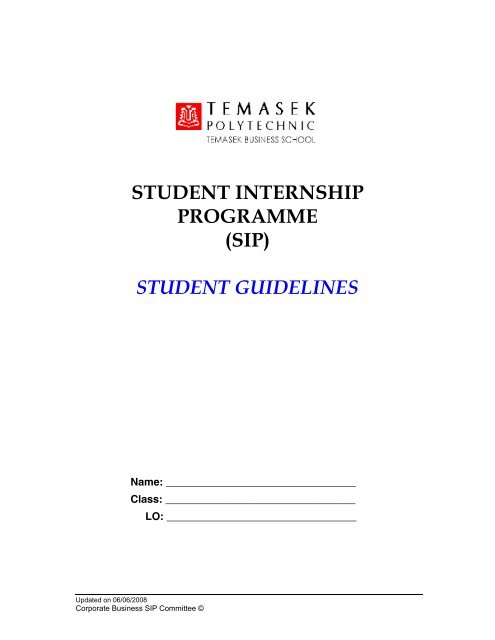
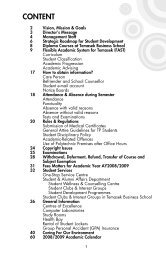
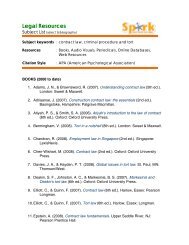
![TP Library Catalogue [ OPAC ]](https://img.yumpu.com/47580918/1/190x146/tp-library-catalogue-opac-.jpg?quality=85)
